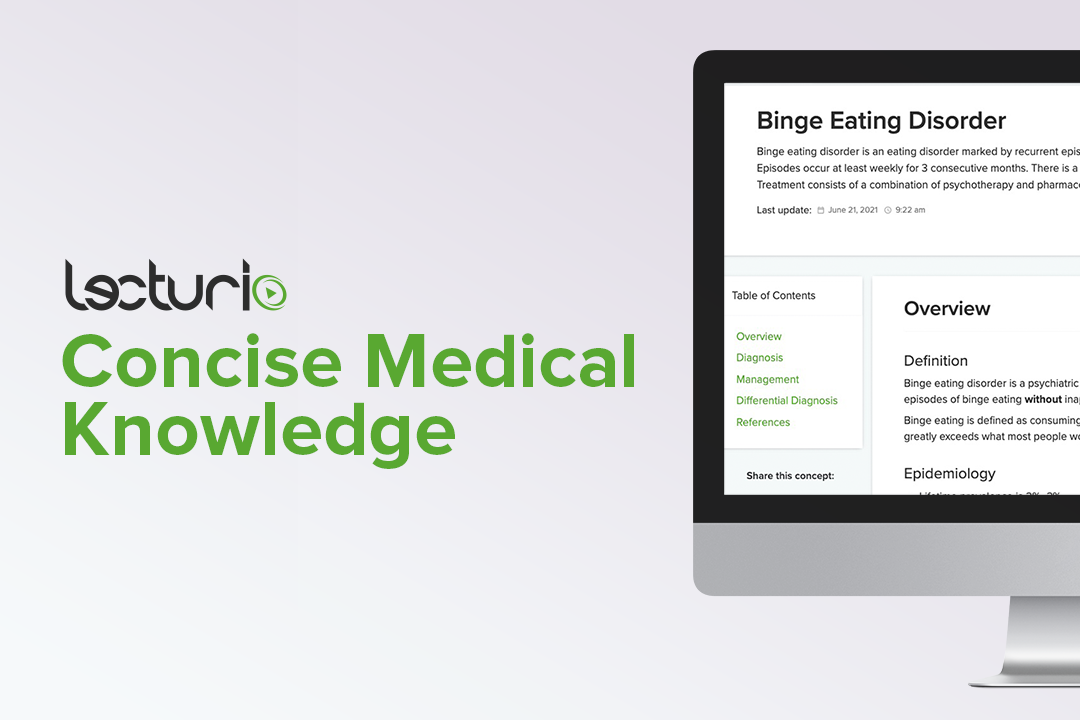Playlist
Show Playlist
Hide Playlist
Binge Eating Disorder
-
Slides BingeEating Psychiatry.pdf
-
Download Lecture Overview
00:01 Now, let's talk about Binge Eating Disorder. 00:04 Adults are more affected with a lifetime prevalence of about 1.9%. 00:09 It more often occurs in females than males and again, it tends to occur in young adults. 00:15 There's increased risk to developing a co-morbid general medical condition including chronic pain, diabetes, and also hypertension for the patient who has a binge eating disorder. 00:27 Some co-morbidities that are very specific to this disorder include specific phobias, social phobias, depression, PTSD, and alcohol abuse or substance dependence. 00:39 Binge eating disorder can be difficult to detect because patients often feel ashamed and they don't usually want to seek out help for this. 00:48 So, some of the clues include a greater than expected weight dissatisfaction, fluctuating weights in your patient or depressive symptoms. 01:00 So, how do you actually define obesity? It's a body mass index of greater than 30 and a body weight greater than 20% the upper limit for patient's height. Binge eating episodes are episodes where a person is eating more rapidly than normal. 01:21 They're eating until they feel uncomfortably full and they eat large amounts of food when they're not really feeling particularly hungry. 01:29 Eating alone is also a clue because these patients are often embarrassed by the large quantities that they're ingesting and they often feel disgusted with themselves. 01:40 Here's something to note. Consuming an amount of food in a discrete period of time such as 2 hours or so that is definitely larger than what most people would eat in a similar amount of time under similar circumstances is describing an episode of binge eating. 02:01 And during these episodes, it's important that to qualify for binge eating diagnosis, that patient feels a sense of lack of control from overeating. 02:11 They feel like they can't stop themselves and they just keep consuming more and more. 02:15 The episodes can occur, on average, at least once a week for about 3 months, and there's no regular use of inappropriate compensatory behaviors. 02:25 So for example, somebody with a binge eating disorder will not then purge or fast to try to keep their weight neutral. 02:32 Instead they just eat. They don't do anything to compensate for it, and they tend to have vastly fluctuating weights. 02:40 Binge eating does not occur solely during the course of anorexia or bulimia and also the severity of binge eating disorders really depends, it can be mild, moderate, or severe based off of how many times a week a person is engaging in these behaviors. It can even be extreme. 02:59 Binge eating treatment includes individual psychotherapy and also behavioral therapy, a strict diet program and exercise routine. Co-morbid disorders need to be treated, things like anxiety and depression, and sometimes medication can be helpful as an adjunct. 03:17 This can help to promote weight loss and also help with co-morbid anxiety and depression. 03:23 So often we think of things like antidepressants can be useful, also sometimes stimulants can help with promoting the weight loss. 03:32 An effective treatment for binge eating disorder, overeating within 2 hours, involves group therapy and also stimulant medication. 03:41 Often combined together, it's more effective than using only one at a time. 03:46 There's a summary of the eating disorders you know about, the diagnosis, and some treatment options.
About the Lecture
The lecture Binge Eating Disorder by Helen Farrell, MD is from the course Control Disorders.
Included Quiz Questions
Which of the following comorbid medical conditions is associated with binge eating disorder?
- Diabetes mellitus
- Hyperlipidemia
- Chronic kidney disease
- Hyperuricemia
- Hyponatremia
Which of the following is FALSE regarding binge eating disorder?
- Binge eating disorder is associated with increased craving for food in patients occurring every day.
- Large weight fluctuations can be seen.
- No regular use of inappropriate compensatory behaviors is seen.
- Unipolar major depression along with social and specific phobias are often seen in patients with binge eating disorder.
- Patients often feel disgusted with themselves, depressed, and guilty after overeating.
Which of the following is an effective therapy for binge eating disorder?
- Behavioral therapy with stimulant and antidepressant medication
- Lithium monotherapy
- Three weeks of SSRIs combined with benzodiazepines
- Pulse dosed benzodiazepines
- Individual behavior therapy
Customer reviews
5,0 of 5 stars
| 5 Stars |
|
5 |
| 4 Stars |
|
0 |
| 3 Stars |
|
0 |
| 2 Stars |
|
0 |
| 1 Star |
|
0 |




